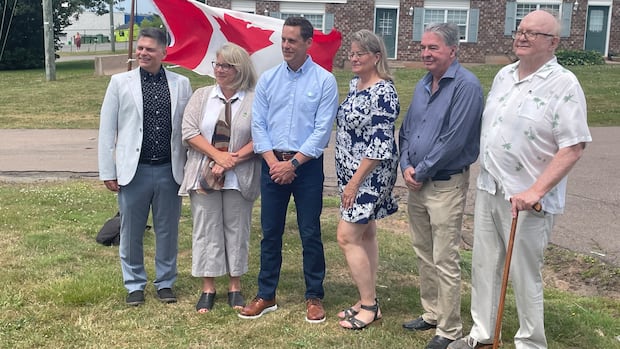P.E.I. hits record housing starts, but experts say more needed to restore affordability
Province needs 2,200 new homes a year to return to pre-pandemic costs, says CMHC

Housing starts on Prince Edward Island reached a record high last year, but a recent report says even more construction is needed to make homes affordable.
In 2024, there were 1,684 housing starts, a 48.7 per cent increase from the previous year and the highest total since the 1970s.
That brings the province close to the goal laid out in its housing strategy, released last year, which identifies the need for an average of 2,000 new homes per year between now and 2030.
But the latest supply gaps estimate report from the Canada Mortgage and Housing Corporation says that, based on projected demand, Canada needs to essentially double its current pace of home construction to return to pre-pandemic levels of housing affordability.
For P.E.I., that means increasing the projected average of about 1,300 annual housing starts between 2025 and 2035 to nearly 2,200 per year — surpassing even the province's all-time record of 2,122 starts set in 1973.
That remains the only year since 1948, the earliest data from CHMC is available, when housing starts on the Island exceeded 2,000.
Construction industry at capacity
Sam Sanderson, executive director of the Construction Association of P.E.I., said reaching 2,200 housing starts may prove difficult.

He said the province's construction sector, which employs more than 8,500 people year-round, is already operating at full capacity.
"To say it's not achievable, I'd be lying," Sanderson told CBC News. "But there needs to be some changes, there needs to be some additions, and there needs to be some investment into construction to even look at those numbers."
Sanderson said innovations in the industry are helping, including pre-manufactured wall systems and modular construction that allow for faster, more affordable builds.
LISTEN | This week's episode of the This is P.E.I. podcast looks into the building boom in the province, and what more needs to be done:
But labour remains a major constraint. The industry is facing a shortage of skilled workers across multiple trades, he said, and productivity has dropped as experienced workers retire.
"We're saying right now, it takes pretty near 2.2 new people to do the same amount of work one person did... 20 years ago or 10 years ago," Sanderson said. "We need to find ways to increase productivity."
The association has been trying to bring more workers into the industry through training programs and outreach. Last year alone it made more than 50 visits to schools across the Island.
But Sanderson said more investment is needed — not just into housing projects, but into people. That includes recruitment, training and skilled trades support, especially as P.E.I. competes with other provinces.
He pointed to Nova Scotia's commitment, announced in 2023, to invest $100 million over three years in recruiting skilled tradespeople as the type of investment P.E.I. needs to match.
"We need to see some large-scale investments like that into our industry here in P.E.I. to be able to increase our capacity to build," Sanderson said.
He added that governments must also prioritize targeted immigration strategies to attract skilled workers for the construction industry.
'The momentum has continued'
Staff with Fusion Charlottetown — a non-profit based in P.E.I.'s capital that advocates for youth and young adults on issues such as housing affordability — the record-breaking year was a welcome development.
The pace has continued. In the first two quarters of 2025, there have already been 751 housing starts — the most for that time period since 1973.

"We're definitely pleased to see it over the past year," said Fusion Charlottetown's vice-president, Matt Pelletier. "What we're pleased to see is that the momentum has continued."
Pelletier acknowledged that the 2,200 target is ambitious, but said it can be within reach.
"With the right mechanisms, the right fiscal tools and the right alignment with land use, it's possible to do that again," he said.
"It's going to require all orders of government coming together to make that happen."
Incentives and policy changes needed
Before the province tabled its 2025-26 operating budget, Fusion Charlottetown submitted a list of policy recommendations aimed at boosting the housing supply.
These included encouraging apartment construction in urban areas and funding "housing-enabling infrastructure" such as roads and sewer systems, which are essential for making new housing developments possible.
Fusion Charlottetown is also calling for the extension of rental construction sales tax rebates to affordable housing projects.
In the fall of 2023, the federal government brought in legislation to remove the GST on new rental developments. Shortly after, the P.E.I. government followed suit by eliminating the provincial portion of the HST for new rental builds in hopes of spurring construction.
Fusion Charlottetown wants to see those rebates expanded to include different forms of affordable housing, such as co-operative housing and affordable home ownership initiatives like Habitat for Humanity projects.
"Creating a sales tax mechanism to allow for those sorts of units to be built would be favourable when it comes to creating affordable housing options," Pelletier said.
Prince Edward Island is managing the housing crisis just about as well as anyone in the country.— Mike Moffatt, Missing Middle Initiative
The organization is pushing for municipal policy changes too, like harmonizing building codes, and it's also advocating for Charlottetown to have a fast-track approval system for affordable housing projects.
"In a lot of cases, the delays relating to those can contribute to the input costs of affordable housing projects, effectively undermining the affordability that they're trying to create," Pelletier said.
Is 2,200 the right number?
Housing policy expert Steve Pomeroy said it's important to look critically at the 2,200 figure and consider whether that many homes are really needed on P.E.I.
Pomeroy, an industry professor at McMaster University and member of the Canadian Housing Evidence Collaborative, said the CMHC's projections are a theoretical exercise focused only on supply.
But he said the real challenge is ensuring affordability — and that won't be solved by supply alone.

Developers are unlikely to build units that would lower their profits, leaving many new homes still out of reach for low-income residents, Pomeroy said.
"So rather than just any kind of supply, we need to think about, how do we actually create supply of more affordably priced homes? Which means invoking the role of the non-market sector, non-profits and co-operatives who respond to different signals than the market does," he said.
"Those are provided with subsidies from government… and they have a mission to address affordability."
Pomeroy pointed to the broader need for more social housing across the country, citing a 2023 Scotiabank report that found just 3.5 per cent of Canada's total housing stock is social housing — half the Organisation for Economic Co-operation and Development average of around seven per cent.
P.E.I. stands out on social housing
Despite Canada's lag in social housing, P.E.I. is making some progress.
The province's housing strategy includes a $176-million investment over five years to establish 560 government-owned social housing units.
In a statement to CBC News, the Department of Housing, Land and Communities said that by the end of the last fiscal year, 227 new social housing units were under design and/or construction. That's already 40 per cent of the five-year target.
The province said it made a "historic" capital investment of $63 million in the 2024-25 fiscal year to support new social housing, adding a record 149 units to the system: 37 through construction and 112 through acquisitions. That surpassed the previous record set in 2023-24, when 142 units were added.
"Through these investments, the social housing registry was reduced to the smallest waitlist in well over a decade, with a low of 389 as of March 31, 2025," the statement read.
A national report card, released by the Missing Middle Initiative at the University of Ottawa, recently evaluated provincial housing policies across Canada. P.E.I. received an A for construction of social housing, the highest grade in the country.
"Prince Edward Island… came out with a plan to increase social housing that was particularly detailed — more detailed than we're seeing here in Ontario," said Missing Middle Initiative founding director Mike Moffatt.
"Overall, I think Prince Edward Island is managing the housing crisis just about as well as anyone in the country."


